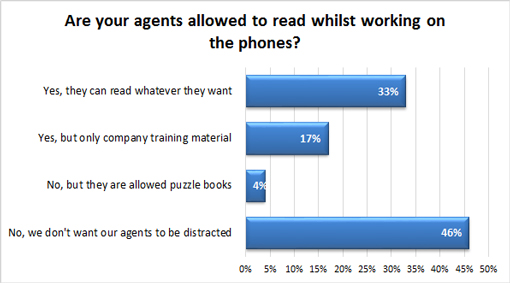We took a closer look at why some managers allow their agents to read between calls, while others forbid it.
What’s the risk of letting people read during quiet periods?
If there is no customer service to be done, and no productive use of an agent’s time possible, there is only so much that can be expected of any employee. I think it’s pretty tough to expect agents to always get stuck into company literature and/or the knowledge base if they have a spare 3 minutes!
It can be easy to act as if agents are responsible for there being no productive work for them to do; they aren’t, and periods of low occupancy occur in even the best-run operations because the vast majority of contact centres don’t have more than 500 positions occupied at all times.
There are always going to be call centre situations where occupancy is low, so my question is “What’s the risk of letting people read during quiet periods?”
With thanks to Paddy
We use lulls between calls as an opportunity for training
Our standard approach is not to allow this activity, even though there are occasions when agents can be waiting a couple of minutes for a call.
In our low season we use a lot of the time for training, development and refreshers.
With thanks to Linda
Agents shouldn’t read anything that isn’t related to the job
I disagree with reading anything non-industry/job/improvement related.
If there is time in between calls, set up regular knowledge reviews online. These should be set up to be completed at the individual’s leisure within a given month/quarter. It is also helpful if these reviews can be saved so the agent can access them as and when they have the chance.
With thanks to Jacqui

Results based on November/December 2013 poll of 606 individuals.
Relevant literature could be useful
A book is going too far, because if you have this much time the manager is not leading.
Relevant literature to the industry type or contract that the calls are related to would be useful to promote lively rapport building and enhance customer service.
With thanks to David
I don’t have time to read
I have to say that in the contact centre where I work I don’t have time to read.
If I am not on a call I am busy with emails or assisting colleagues with enquiries or a challenge they may have.
With thanks to David
If there is enough time to read then you are overstaffed!
If there is enough time between calls to read a book or a magazine, then you are overstaffed!
There should be a reasonable time delay between transactions so that your agents don’t get burnt out, and there are always peaks and troughs too. But that’s where a decent WFM tool comes in to anticipate, forecast, plan and schedule.
With thanks to Richard
Work is for work and breaks are for personal reading
I think that work is for work and breaks are for personal reading, emails and texting.
The company is after all paying for people’s time whilst they are in work.
With thanks to Jacqui
It’s OK when volumes are more sporadic
I’ve previously managed a contact centre where we didn’t allow reading during core hours (7am-7pm) and instead focused agents on other ‘work’. However, after 7pm, when volumes were more sporadic, we did.
But if occupancy is so low that people have excessive reading time then you should review your staff numbers.
With thanks to David
It could be an opportunity for research and personal development
In regard to reading itself, I’d first ask myself the question whether there is more value-adding work agents can do, such as product/procedural research (especially if they’re not 100% on target in all areas) or focus on their personal development planning.
With thanks to David
>I don’t know how agents could have enough time to read
I’ve got to admit I’m scratching my head a little about how agents can have so much free time between calls.
With thanks to Robert
There is always something to do other than read
Maybe I’ve just been in very busy call centres, but the few times that the pace drops off there is always something to do.
Whether it’s personal maintenance like stretching or bathroom breaks, or organising some non-directly-related-to-a-call materials.
With thanks to Vytautas
They should only read material related to work
If Agents or CSR have time to read they should read things relevant to their work such as campaign or knowledge-base materials.
If I am not on a call I would be busy with emails or assisting other members with enquiries or a challenge they may have.
With thanks to Rachel
They could be given something more productive to do
As a general rule of thumb, I would lean towards not allowing agents to read at their desks.
If they have time to read between calls then they could be given something more productive to do, e.g. fulfilment, data cleansing, etc.
The same can be said for internet usage.
With thanks to Mathew
Allowing non-work material is a big risk
You are recruiting staff to do a job. Reading non-work-related material is not something that comes with the job, so it is a big risk to allow this – why should staff be sitting around?
If that happens, sometimes it is a good opportunity for managers/team leaders to spend time with staff and talk to them about individual performance.
With thanks to Baljinder
Author: Megan Jones
Published On: 2nd Apr 2014 - Last modified: 14th Feb 2025
Read more about - Call Centre Questions, Occupancy, Robert Tuck, Work Policies
















We operate a 24/7 center. Peak/core hours, reading is not allowed, however outside of peak hours, there is a more relaxed approach to it. Once, of course, all off phone work is completed.
I think some of the comments to this question fails to recognize that some projects have a very low volume but at the same time there is a minimum number of people you can have on site.
You can’t have 0,2 people and you also need to cover for vacation, training etc.
If the project is not paid by performance but via a set FTE payment, what’s the harm?
As long as people are at the top of their game when needed.
With contact centre work still bedevilled by high turnover, high absenteism and the perception of the work by outsiders as the kind of work that’s best avoided, absolutely anything that humanises the work and treats the agents less like machines or factory farm animals is fine by me.
I am a little concerned but not surprised that the attitude of many comments here is more reminiscent of the attitudes of Victorian factory owners.
If the quality of the agent, their performance and their dwell time is to improve – as it needs to for the sake of the industry – then the management culture of contact centres will have to change and improve the enviroment for the agent
Allowing your staff to read between calls is discretionary, I work for a company that keeping up to date is necessary in order to function. That being said, do staff read the required materials?
I think the very first answer is the most realistic. There’s only so much time you can spend in the knowledge base. The idea that “there’s always something work related to read!” is not always realistic. Given that these time periods are probably in the 30-180 second range, unless your managers are hovering around watching for people to hang up a call, and leap on them for a 2 minute review, saying it should be management time isn’t realistic either.
Occupancy can be too low, but the general idea that “if agents have time to read, your WFM/staffing is bad” is also very simplistic. If you have a very high SL (say 95% in 10 seconds) you will often have a low occupancy – it’s not ideal, but it’s required.
And really – if they can’t read, they’re just going to find another method. Texting, chatting, emailing, etc. Unless you’re restricting all of their forms of communication (including just leaning over to the person next to them), they’re going to use their time. And suggesting that they should have 0 seconds of personal time at work is, again, non-realistic. How much time do you, as a manager/wfm/etc spend just chatting with coworkers?
I allow reading during down time in my call center. The time is also used for training and improvement. By taking the agents mind away from routine, stressful and sometimes mundane call center material is a healthy balance; preventing burn-out with the right balance and much better than hearing venting. In essence this is another item that has to be managed right along with (texting, surfing the web etc.) just like everything else we have to do in a call center environment.
I think it depends on your service level goals. We have a very high 80/20 goal and in order to be able to answer 80% of the calls in 20 seconds or less there are going to be down times. The advisors are allowed to read a magazine or check their text messages when ever they are not on a call. Treating the employees like adults leads to lower turnover which saves the agency money.
Don’t have time to do anything between calls as only have 3 secs before next one comes in and it is like this all day every day, bit wearing on a 10 hour shift